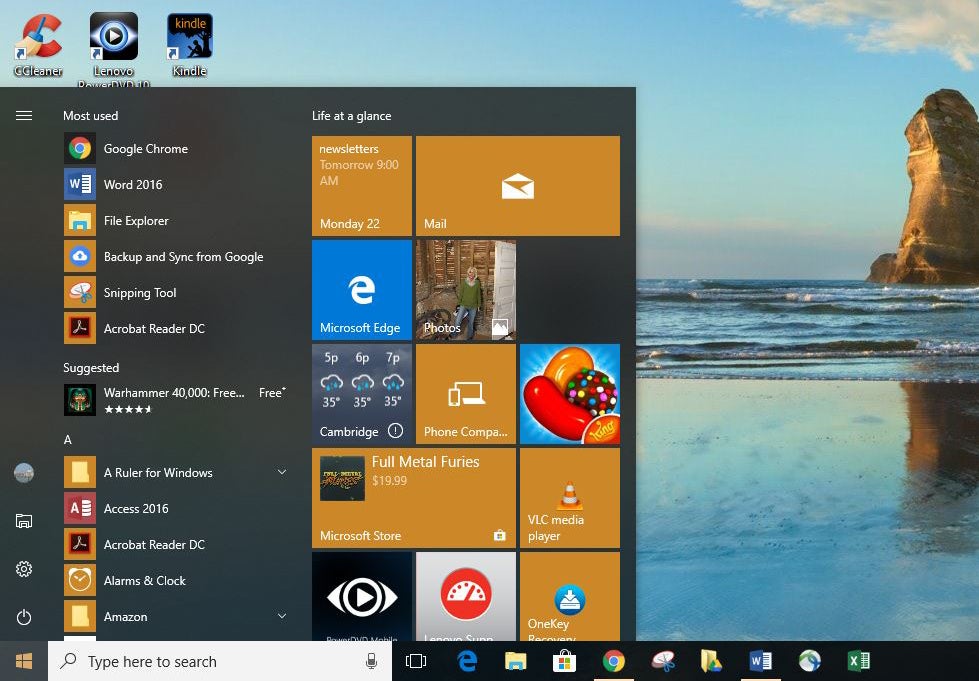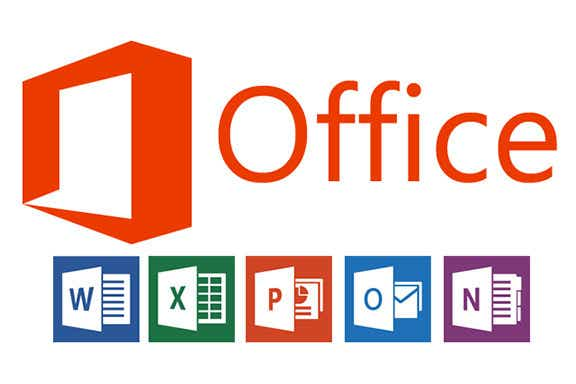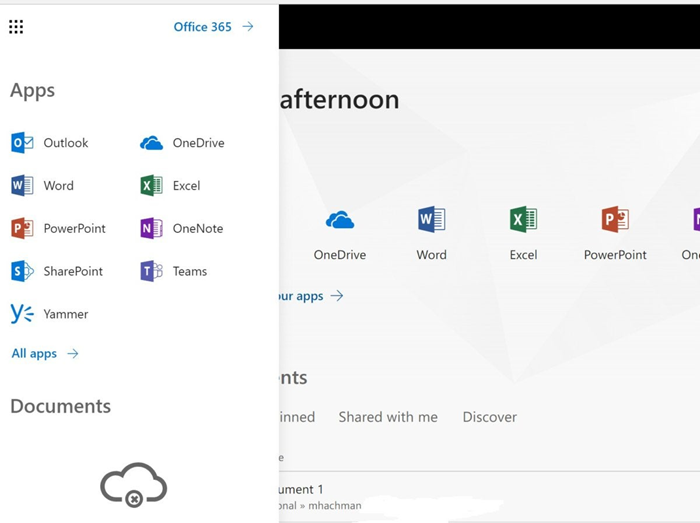Chromebooks Versus Windows Laptops: Choosing Which Laptop to Buy | Shop Electronics in Rwanda
Have you ever wondered how some of our laptops are so affordable. For example this touchscreen laptop costs just about 260,000 Rwf. That is partly due to the fast that these are Chromebooks and are a bit different from laptops that you are used. This article explains what Chromebooks are. You will realise that it is a bit like the way iPhone are different from Android phones, yet they are all smartphones.
What’s the difference between a Chromebook and a Windows PC?
Windows PCs run Microsoft Windows 10 (and soon, Windows 11), the dominant operating system for traditional PCs for more than 25 years. They run Windows applications, from Microsoft titles to a raft of third-party software. Windows PCs are available in desktop and laptop forms, and can be configured in infinite ways to accommodate needs from basic productivity to resource-intensive workstations.

Windows 10 Start Menu
The Start menu is command central for Windows 10. (Click image to enlarge it.)
Chromebooks are much simpler. They run Chrome OS, essentially a Chrome web browser vehicle, and are often priced several hundred dollars less than a Windows PC. The newest Chromebooks contain a bonus, however: the ability to run some Android apps (more on this later—Android apps are coming to Windows 11, too.). Another perk: the ability to run Linux—not something that most users will care about, but a useful niche addition. (Windows 10 users can run Linux as well.) Chromebooks may be cheap, but they’re surprisingly flexible.

In a Chromebook, many of the apps reside below the taskbar.
Physically, a Chromebook looks much like a Windows-powered notebook, with a keyboard, a display, a front-facing camera for videoconferencing, and so on. But there are a few key differences: Chromebooks typically include a dedicated search keyboard key, while Windows emphasizes the Windows key. With Windows, you’ll have many hardware choices, including a typical clamshell notebook, convertibles with 360-degree hinges; 2-in-1 Windows tablets with detachable keyboards, or pure Windows tablets.
Inside, the only real differences are the processor. Windows PCs have a wide range of microprocessors powering them, usually chips from AMD and Intel, or more recently, a Qualcomm Snapdragon.
Chromebooks generally favor lower-performance Intel Atom chips (branded as Pentium or Celeron), Snapdragons, or lesser-known processors from the likes of Mediatek or Rockchip, that are suited to the lighter demands of Chrome OS.
Chromebook and Windows PCs features have a lot of overlap, too. Though you’ll find that many Chromebooks and inexpensive laptops feature a similar HD (1366×768) or Full HD (1920×1080) display, Windows usually requires a bit more in terms of memory and storage. Both a Chromebook and a laptop can run acceptably on 4GB of memory, but 8GB is preferred where Windows notebooks are concerned.
Windows notebooks, too, typically include more local storage for the Windows OS and associated apps: 128GB or 256GB is acceptable, though there’s really no upper limit. Chromebooks, meanwhile, don’t need much more than 16GB or so, assuming Google-oriented users are taking advantage of the Drive online storage, or stashing Android apps on an SD card. Less storage means less cost; many Chromebooks also use inexpensive eMMC flash storage to save even further. Both Chromebooks and Windows tablets allow external storage.
Is a Chromebook or laptop better for office/study work?
Productivity apps—word processing, spreadsheets, and the like—represent the majority of the working day. Here, both Windows and Chromebook users alike have several choices, and both are honestly about equal in this regard. Chromebooks can run Microsoft’s Office apps as Android applications, while Windows PCs can run Google Workspace apps on the web.

You might think that Office would be restricted to Windows, but that’s not true either: Office.com, also known as Office Online, runs in a web browser, and—assuming you have a subscription to Office 365 (now called Microsoft 365)—offers nearly all the functionality that the Office 365 suite does. (Microsoft Office apps are also available as Android apps, but it’s simpler to run them within the browser.) In fact, given that it’s powered by the cloud, you’ll find that Office Online sometimes gets updated with new features before they arrive on Microsoft 365. Office is typically used by most enterprises, and if your company administrator allows it, even shared corporate resources may be accessible via a Chromebook.
There’s one tweak: as of August 2021, Microsoft won’t support the Android version of Office apps on a Chromebook. That doesn’t mean you can’t run Office on a Chromebook; you’ll just need to use Office.com (AKA Office Online) instead.
The Google Workspace suite also runs online, though it’s focused on the essentials, with fewer features than Office but a renewed focus on collaboration. I spent over a year exclusively working on a Chromebox (the nearly defunct desktop version of a Chromebook) and found Google’s simple interface and instantaneous autosaves superior to the Windows version of Office at the time. (Office apps like Word now autosave, too.) For our purposes, both Google Workspace and Office Online will run on either a plain Chromebook or Windows PC; however, if you need access to a local copy of Office, only a PC will suffice.

Office Online (Office.com) is accessible via a browser from either a Chromebook or Windows PC.
The gist is that productivity is possible on either a Chromebook or Windows PC with a minimal amount of effort, though you’ll may want to pay for a subscription for either Office or Google’s suite of apps to get maximum benefit and storage space. You may also find Windows PCs a bit more easy to configure for printing.
From a hardware perspective, it’s our view that a laptop form factor is more convenient than an add-on keyboard, or external Bluetooth keyboard option. Take the cramped detachable keyboard on the Lenovo Chromebook Duet, for example. While tablets make Android apps more convenient, the tradeoff is less productivity when in laptop mode.
Can I run Windows apps on Chromebooks?
Yes and no. Parallels Desktop for Chromebook Enterprise is a new feature that Google just introduced on Chromebooks, but not all of them. Parallels provides quick access to legacy and full-featured applications, like Microsoft Office, locally on Chrome OS—which means that they’ll even work offline. However, Parallels is a managed solution for enterprises with IT managers, meaning that you won’t be able to take advantage of this with a cheap Chromebook that you’ll buy from Amazon.
Could this capability to run Windows apps be extended to consumer Chromebooks in the future? Possibly. But right now it’s out of reach for most users.
Which Chromebook or laptop should I buy?
Of the Chromebooks we’ve reviewed, we have chosen to bring these 3 that we highly recommend from Acer:
Acer Chromebook 315: Laptop with a big screen (15 inch) screen with long battery life, with a touchscreen. It is ideal for people who like watching movies. Acer Chromebook 14: It is also a touchscreen laptop with 14 inch screen. Finally, Acer Chromebook 314 is a budget but well-designed Chromebook at 210,000 Rwf.
However, if you prefer Windows laptop, we have laptops from Chuwi. Chuwi is a Chinese manufacturer known for inexpensive, good looking laptop. Check Chuwi HeroBook Pro
It’s fair to say that Windows offers a more comprehensive experience, but Chrome OS is a significantly simpler, cheaper alternative. The buying decision usually works out to something like: “I can do almost everything in Windows with a Chromebook, but…” It’s that last little bit—printing, file management, etc.— that will guide your decision. Good luck!
MENTIONED IN THIS ARTICLE
Our Collection of Quality Laptops to buy in Rwanda.
Recent Posts
-
The best Amazon Fire apps for kids of all ages – for FREE!
Best Kindle Fire apps for 2 year oldsThe best toddler games on the Amazon Fire are the simple ones! …26th Jun 2022 -
7 Interesting Features of a Smart Watch
Smartwatches have made a name for themselves and have carved a niche of their own worldwide. With th …13th Jun 2022 -
TOP FIVE THINGS TO EXPECT FROM THE HUAWEI P40 LITE | BUY HUAWEI P40 LITE IN RWANDA
A Powerful Cell Phone: The HUAWEI P40 LiteThe HUAWEI P40 lite combines powerful performance with exc …24th Oct 2021
